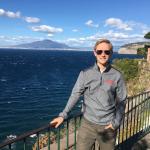Support
In the fall of 2017, I spent an amazing and life-changing semester in Copenhagen, Denmark. It has always been a dream of mine to travel to Italy and learn about the ancient Romans, and I pursued this interest in high school by taking four years of Latin. Minoring in anthropology at St. Lawrence has given me a greater appreciation for the study of ancient life, increasing my desire to explore a part of the ancient Mediterranean world. Studying for a semester in Europe gave me the opportunity to make this dream a reality, and I was given the funds to explore the vast ruins of Pompeii and the great city of Rome.
My trip began in Sorrento, Italy, a small town near the Amalfi Coast. Some small ruins could be found near the city, as well as on the nearby island of Capri. Exploring the ruins of Villa Jovis on Capri, one of Emperor Tiberius’ summer homes, was my first taste of a large, preserved archaeological site. The following day, I visited Pompeii, an ancient city far larger than I had ever imagined. I had the opportunity to explore an ancient bath house, the home of the wealthiest family of the city, a brothel, the basilica, and the forum, and learned about the day to day lives of the once great Pompeiians. Following the in-depth tour of Pompeii, I was bussed close to the top of Mt. Vesuvius, the giant volcano responsible for the destruction of Pompeii, and hiked up to the rim of the still active volcano. Looking down on the Bay of Naples from the top of Mt. Vesuvius was incredible, and also a haunting reminder of the tragedy that befell its victims.
From Sorrento I traveled along the Italian countryside to Rome, where I was treated to more incredible structures commemorating ancient Roman life. I was able to visit the Colosseum, the Roman Forum, Palatine Hill, and Capitoline Hill. Exploring and learning about the importance of various ancient cultural centers in their lives was interesting and eye-opening. Learning about the lives of the ancients in a classroom is one thing – I had done that enough in Latin and my anthropology courses – but actually being there and seeing what they saw grants you a new perspective. It is easier to understand and put into context why they did what they did.
Without visiting these ancient places, I would not have a thorough understanding of the importance of studying ancient peoples and their role in developing contemporary society. The things I’ve learned as a result of my travel enrichment grant will greatly aid my studies of anthropology at SLU, as I will have a better appreciation for the context of my studies. Traveling to Italy and exploring the lives of the ancient Romans is an experience I will never forget, and I am forever grateful for this opportunity.
